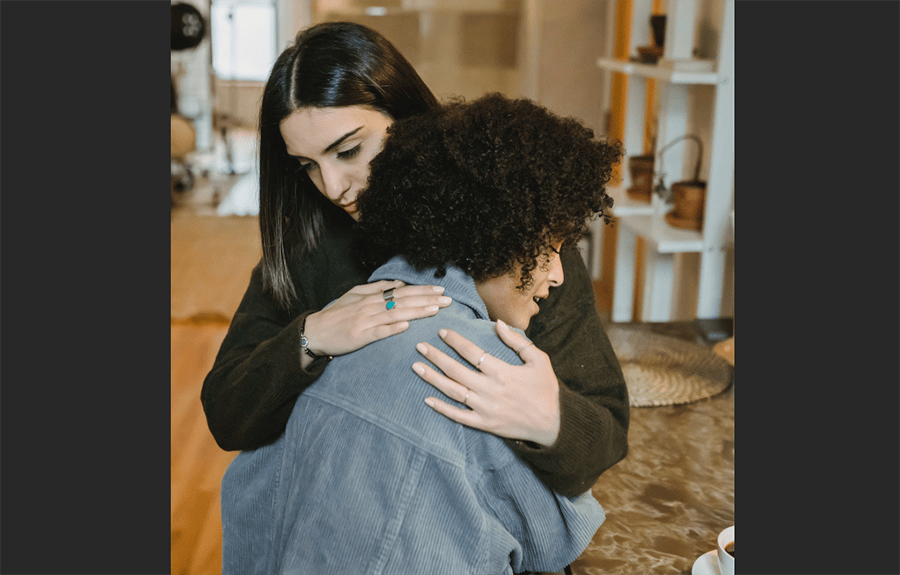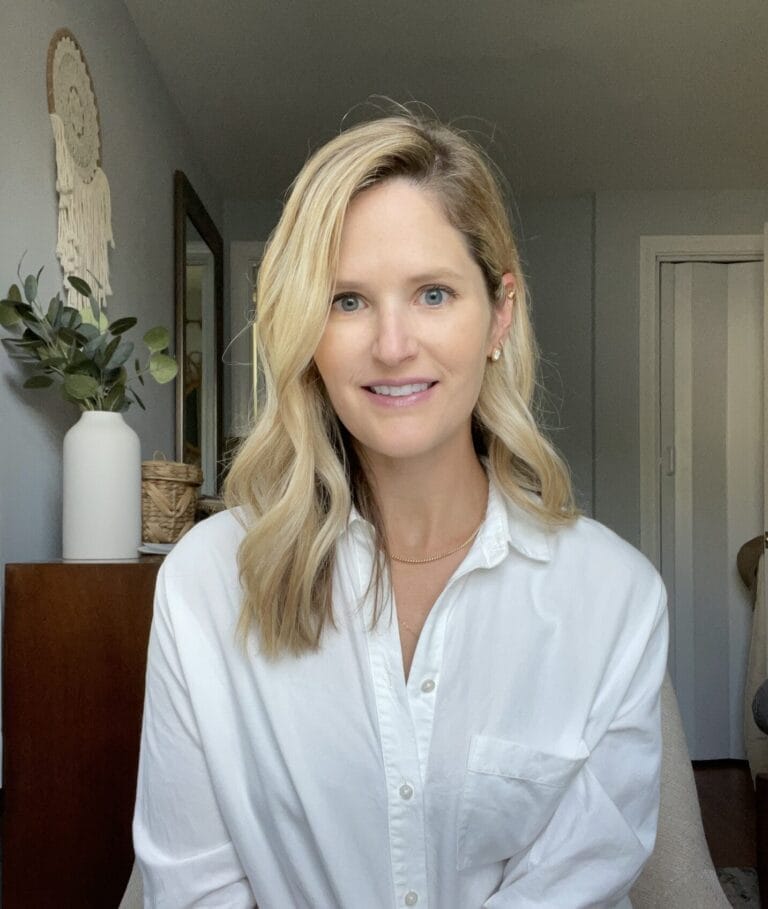
Sadness vs. Grief
Sadness is a temporary emotional reaction to a loss or disappointment. It generally passes in a couple of days. Grief is less an emotional reaction TO something and more an actual embodiment of loss. It’s the experience of being changed by the loss.
When we grieve we embody the sense of loss – we don’t feel the grief; we are the grief. We encompass all that grief is. There is a physical experience of grief as well – wanting to isolate and draw into ourselves. Cognitively, there’s also a sense of disorganization and a lack of focus. It’s intertwined cognitions, feelings, and bodily sensations.
A Grief Model
A Swiss psychiatrist, Elisabeth Kübler-Ross, first introduced her five-stage grief model in her book, On Death and Dying in 1969. Kübler-Ross’ model was based on her work with terminally ill patients, and has received much criticism in the years since. Primarily, this was because those studying her model mistakenly believed this was the specific order for grieving people and that everyone goes through all of the stages.
Subsequently, Kübler-Ross noted that these stages are not linear, that some people may experience only some of them, and still others may not experience any of them at all. That said, these five stages of grief are the most commonly observed to be experienced by the grieving population.
The Five Stages of Grief
Denial
Denial is the stage that can initially help someone survive the loss. Life doesn’t seem to make sense, has no meaning, and is too overwhelming. The terrible news is denied, and, in effect, the person goes numb.
It’s common in this stage to wonder how life will go on in this different state – you are in a state of shock because life as you once knew it, has changed in an instant.
Someone diagnosed with a deadly disease might believe the news is incorrect – the blood work in the lab was mixed up with someone else’s. Learning that a loved one has died will be met with clinging to a false hope that the wrong person was identified. In the denial stage, the “actual reality” is exchanged for a “preferable reality.”
Ironically, it is denial and shock that help one cope and survive the grief event. Denial aids in pacing the feelings of grief. Instead of becoming completely overwhelmed with grief, the denial staggers and reduces its full sudden impact.
Anger
Re-entering “actual” reality again from “preferable” reality often brings anger along with it. Thoughts such as, “why me?” and “life’s not fair!” surface in this stage. It may seem beyond comprehension how something like this could happen. Blaming others for the grief or redirecting anger to close friends and family are not uncommon.
Mental health professionals backed by extensive research agree that such anger is an essential and necessary stage of grief, and needs to be encouraged.
They emphasize that it is beneficial to truly feel the anger. It’s thought that, even though a person may feel that he/she is in an endless cycle of anger, it will dissipate – and the more one truly feels the anger, the quicker it will dissipate and expedite the healing.
Anger can also be a pathway to reconnect to the world after isolation during the denial stage. When a person is numb, this results in feeling disconnected from everyone. On the other hand, when one is angry, there is a connection, albeit unhealthy.
Negotiation
Negotiation or bargaining is the way to continue to grasp those strands of hope while being buried beneath unbearable emotional pain. When confronted with this untenable reality, one truly believes that he/she is willing to do anything and everything to restore life to what it was before the loss.
And often these thoughts are not bound to what could be done in the future, but may include the past as well. For example, a person may be thinking in terms of “what if” or “if only”: what would it take for everything to return to normal; what could have been done differently to avoid this devastating loss?
And once a person goes down this path, it’s a slippery slope into guilt as the griever subconsciously struggles to regain a modicum of control by taking responsibility, even at his/her own expense.
Then come the endless “what if” statements. What if I had left the office 10 minutes sooner – the accident wouldn’t have occurred. What if I had encouraged her to see the doctor three months ago as I had initially thought – the tumor could have been discovered sooner, been removed, and she would still be alive.
These thoughts and emotions are quite common. And as painful as they are to experience and endure, they are therapeutic because they help the person confront the reality of the loss.
Depression
Most people regard depression as a bona fide expression of grief. When confronting a debilitating loss, depression isn’t a symptom of a mental health condition. Instead, it’s a natural and appropriate response to grief.
Depression is the sensation of the heartbreak and emptiness we feel when navigating reality and realizing that the person or situation is gone forever. In this stage, the one who is grieving might withdraw from life, feel numb, live in a fog, and not want to get out of bed in the morning to confront life. It’s too overwhelming!
And it’s difficult to muster the strength to face another day in the world. There is no interest in being around others or talking to anyone — only feelings of helplessness and hopelessness. Depression may even be accompanied by suicidal thoughts – wondering, “what’s the point of going on?”
Acceptance
The final stage of grief identified by Kübler-Ross is acceptance. Essentially, it is entering the new reality by coming to terms with the fact that the “new” reality is that the loved one is never coming back – or that illness will soon result in death.
Acceptance isn’t necessarily about being okay with the loss. Some people may never feel this way, and that is understandable. Rather, acceptance is more about acknowledging the losses that have been experienced, learning to live with them, and readjusting accordingly.
While the loss isn’t a “good” thing – it is something that can be lived with. The stage of acceptance is a time of adjustment and readjustment. There are good days, there are bad days when one feels uncontrollably sad, and then the good days return once more.
It is important to remember that reaching the stage of acceptance doesn’t preclude “moving back” to another stage of grief. Moving back-and-forth between stages is natural and all part of the healing process.
The 6th Stage: Finding Meaning
David Kessler has recently documented a sixth stage beyond acceptance: finding meaning. Finding meaning presumes that there is the possibility of being able to discover something meaningful in the grief itself.
While most people speak of finding “closure” after a loss, Kessler talks about learning to remember those who have died with more love than pain, which involves learning to move forward in a way that honors the loved one who has passed on.
According to Kessler, “It’s not about finding meaning in the death – there is no meaning there. What it’s about is finding meaning in the dead person’s life, in how knowing how they shaped us, maybe in how the way they died can help us to make the world safer for others.”
In other words, finding meaning is something the bereaved can do after the death of someone they loved very much. It’s how those who are still alive can integrate the existence of the lost individual into their lives in a very positive and productive way.
It’s how they can allow the deceased to change them, and how they can behave in responding to it. And, perhaps most important, finding meaning is “the stage where the healing often resides.”
Anyone who has grieved a loved one would give up in a blink of an eye, the growth they have experienced, if it would bring their loved one back, but that’s the one thing that no one can do. So the only choice is to grow and find meaning.
And aside from the obvious benefits for one’s self, we have to remember, too, that the deceased would have wanted us to find meaning in our lives because of them.
The bottom line about grief, says Kessler, is this: there’s no wrong way to do it. Grieving is as individual as each of us; our grieving needs are different, in every case.
The Surprising Consolation of Grief
Kessler tells a story: he was speaking at a conference in a big hotel, and other conferences were going on in the rooms around his. “Afterwards a member of the hotel cleaning team came up to me and asked: ‘What was your group working on? Because so much laughter was coming from your room.’”
The reason, says Kessler, is that people who have been in the deepest depths of despair have the broadest bandwidth when it comes to enjoying life: “When you’ve traveled through the deepest valleys, you surely appreciate the views from the highest hills.” And for those who have traveled together through the deepest of valleys, that’s a very important and uplifting message to hear.




